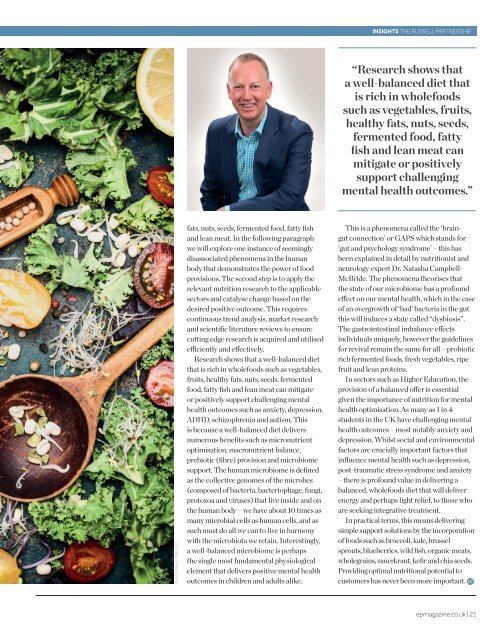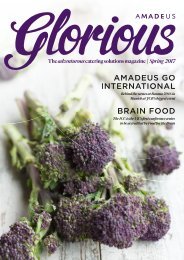EP Insights & Action
Expert observers comment on the Industry. This magazine is designed to bring together the thought leadership, ideas and opinions of leading consultants and operators from across the industry. EP's vision is to create an open narrative and debate that explains the perspective and thinking on the market and Industry. It will help all progress, so let us know your thoughts, subscribe and be involved.
Expert observers comment on the Industry. This magazine is designed to bring together the thought leadership, ideas and opinions of leading consultants and operators from across the industry. EP's vision is to create an open narrative and debate that explains the perspective and thinking on the market and Industry. It will help all progress, so let us know your thoughts, subscribe and be involved.
You also want an ePaper? Increase the reach of your titles
YUMPU automatically turns print PDFs into web optimized ePapers that Google loves.
INSIGHTS THE RUSSELL PARTNERSHIP<br />
“Research shows that<br />
a well-balanced diet that<br />
is rich in wholefoods<br />
such as vegetables, fruits,<br />
healthy fats, nuts, seeds,<br />
fermented food, fatty<br />
fish and lean meat can<br />
mitigate or positively<br />
support challenging<br />
mental health outcomes.”<br />
© VICUSHKA | 123RF.COM<br />
fats, nuts, seeds, fermented food, fatty fish<br />
and lean meat. In the following paragraph<br />
we will explore one instance of seemingly<br />
disassociated phenomena in the human<br />
body that demonstrates the power of food<br />
provisions. The second step is to apply the<br />
relevant nutrition research to the applicable<br />
sectors and catalyse change based on the<br />
desired positive outcome. This requires<br />
continuous trend analysis, market research<br />
and scientific literature reviews to ensure<br />
cutting edge research is acquired and utilised<br />
efficiently and effectively.<br />
Research shows that a well-balanced diet<br />
that is rich in wholefoods such as vegetables,<br />
fruits, healthy fats, nuts, seeds, fermented<br />
food, fatty fish and lean meat can mitigate<br />
or positively support challenging mental<br />
health outcomes such as anxiety, depression,<br />
ADHD, schizophrenia and autism. This<br />
is because a well-balanced diet delivers<br />
numerous benefits such as micronutrient<br />
optimisation, macronutrient balance,<br />
prebiotic (fibre) provision and microbiome<br />
support. The human microbiome is defined<br />
as the collective genomes of the microbes<br />
(composed of bacteria, bacteriophage, fungi,<br />
protozoa and viruses) that live inside and on<br />
the human body – we have about 10 times as<br />
many microbial cells as human cells, and as<br />
such must do all we can to live in harmony<br />
with the microbiota we retain. Interestingly,<br />
a well-balanced microbiome is perhaps<br />
the single most fundamental physiological<br />
element that delivers positive mental health<br />
outcomes in children and adults alike.<br />
This is a phenomena called the ‘braingut<br />
connection’ or GAPS which stands for<br />
‘gut and psychology syndrome’ – this has<br />
been explained in detail by nutritionist and<br />
neurology expert Dr. Natasha Campbell-<br />
McBride. The phenomena theorises that<br />
the state of our microbiome has a profound<br />
effect on our mental health, which in the case<br />
of an overgrowth of ‘bad’ bacteria in the gut<br />
this will induces a state called “dysbiosis”.<br />
The gastrointestinal imbalance effects<br />
individuals uniquely, however the guidelines<br />
for revival remain the same for all – probiotic<br />
rich fermented foods, fresh vegetables, ripe<br />
fruit and lean proteins.<br />
In sectors such as Higher Education, the<br />
provision of a balanced offer is essential<br />
given the importance of nutrition for mental<br />
health optimisation. As many as 1 in 4<br />
students in the UK have challenging mental<br />
health outcomes – most notably anxiety and<br />
depression. Whilst social and environmental<br />
factors are crucially important factors that<br />
influence mental health such as depression,<br />
post-traumatic stress syndrome and anxiety<br />
– there is profound value in delivering a<br />
balanced, wholefoods diet that will deliver<br />
energy and perhaps light relief, to those who<br />
are seeking integrative treatment.<br />
In practical terms, this means delivering<br />
simple support solutions by the incorporation<br />
of foods such as broccoli, kale, brussel<br />
sprouts, blueberries, wild fish, organic meats,<br />
wholegrains, sauerkraut, kefir and chia seeds.<br />
Providing optimal nutritional potential to<br />
customers has never been more important.<br />
epmagazine.co.uk | 21
















